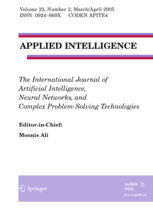
APPLIED INTELLIGENCE
Scope & Guideline
Shaping the landscape of applied intelligence for tomorrow.
Introduction
Aims and Scopes
- Artificial Intelligence Applications:
The journal covers a wide range of applications of AI, including healthcare, finance, transportation, and environmental monitoring, focusing on how AI can be used to enhance decision-making, prediction, and automation. - Machine Learning Techniques:
Research on various machine learning techniques, including supervised, unsupervised, and reinforcement learning, is a core focus. This includes advancements in neural networks, deep learning, and ensemble methods. - Data Mining and Knowledge Discovery:
The journal publishes studies on data mining techniques, including frequent pattern mining, anomaly detection, and knowledge graph construction, highlighting how these methods can be integrated into intelligent systems. - Optimization Algorithms:
Research on optimization techniques, including genetic algorithms, swarm intelligence, and hybrid methods, aimed at improving the performance of AI systems in various applications. - Human-Computer Interaction:
The journal explores how AI can enhance human-computer interaction, focusing on user experience, adaptive interfaces, and personalized systems. - Explainability and Interpretability of AI:
There is a growing emphasis on the explainability of AI models, addressing the need for transparency and trust in AI systems, particularly in sensitive applications like healthcare and finance.
Trending and Emerging
- Deep Learning Innovations:
There is a significant increase in publications focusing on innovative deep learning architectures and techniques, particularly in areas like computer vision, natural language processing, and generative models. - Federated Learning and Privacy-Preserving Technologies:
Research in federated learning has gained momentum, reflecting a growing concern for data privacy and security, especially in applications involving sensitive personal data. - Explainable AI (XAI):
The demand for explainable AI has surged, with researchers exploring methods to make AI systems more interpretable and accountable, addressing ethical concerns in AI deployment. - AI for Social Good:
A notable trend is the application of AI to address social challenges, such as healthcare disparities, climate change, and disaster response, indicating a broader societal impact focus. - Integration of AI with IoT and Edge Computing:
The convergence of AI with the Internet of Things (IoT) and edge computing is emerging as a critical research area, emphasizing real-time data processing and intelligent decision-making on devices. - Multi-Modal Learning:
There is an increasing interest in multi-modal learning approaches that combine data from various sources (text, images, audio) to enhance model performance and robustness.
Declining or Waning
- Rule-Based Systems:
While rule-based systems were once a significant focus in AI research, their prominence has diminished in favor of data-driven approaches, particularly deep learning models that offer greater flexibility and accuracy. - Traditional Expert Systems:
The decline in the publication of traditional expert systems indicates a shift towards more adaptive and learning-based systems that can handle uncertainty and variability in real-world applications. - Static Machine Learning Models:
There is a noticeable reduction in research on static models that do not adapt or learn from new data, as the field moves towards dynamic and continual learning frameworks. - Basic Statistical Methods in AI:
The prevalence of basic statistical methods has decreased as more complex and sophisticated techniques, such as deep learning and ensemble methods, have become more mainstream. - Single-Task Learning Approaches:
Research focusing solely on single-task learning is waning as multi-task learning and transfer learning approaches gain traction, allowing models to leverage shared knowledge across different tasks.
Similar Journals

NEURAL COMPUTING & APPLICATIONS
Driving Insights in Artificial Intelligence ApplicationsNEURAL COMPUTING & APPLICATIONS is a premier journal dedicated to the burgeoning fields of Artificial Intelligence and Software Engineering, published by Springer London Ltd. Established in 1993, the journal serves as a pivotal platform for disseminating cutting-edge research and innovative applications in neural computing, covering a broad range of topics from algorithm development to real-world applications. With its impressive categorization in the 2023 Journal Quartiles—ranging Q2 in Artificial Intelligence and Q1 in Software—it stands out in its discipline, ranking 42nd out of 407 in Computer Science Software and 50th out of 350 in Computer Science Artificial Intelligence, reflecting its significant impact in the academic community. Although not an open access journal, it provides vital access to significant findings and methodologies that drive advancements in technology. Researchers, professionals, and students looking to stay abreast of the most relevant and impactful developments in these fields will find NEURAL COMPUTING & APPLICATIONS an indispensable resource.

International Journal of Advanced Computer Science and Applications
Connecting Scholars to Shape the Future of Computing.International Journal of Advanced Computer Science and Applications, published by SCIENCE & INFORMATION SAI ORGANIZATION LTD, stands as a significant platform in the ever-evolving field of computer science. With its ISSN 2158-107X and E-ISSN 2156-5570, the journal aims to disseminate high-quality research and innovations from diverse areas within computer science, embracing cutting-edge technologies and methodologies. As of 2023, it holds a commendable Q3 ranking in the field, placing it among a competitive cohort of journals while showcasing its commitment to scholarly excellence. The journal operates under an open access model, ensuring that its content is widely accessible to researchers, professionals, and students alike, thereby fostering a collaborative environment for knowledge-sharing and advancing the discipline. With a history of converged contributions from 2017 to 2024, the International Journal of Advanced Computer Science and Applications serves as a vital resource for those seeking to stay at the forefront of computer science research and applications.
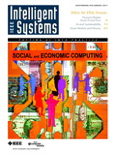
IEEE INTELLIGENT SYSTEMS
Connecting Minds Through Intelligent TechnologiesIEEE Intelligent Systems, published by the renowned IEEE Computer Society, stands at the forefront of research in the fields of Artificial Intelligence and Computer Networks and Communications. With an impressive Q1 ranking in both categories as of 2023 and Scopus rankings placing it in the top 5% of its field, this journal not only showcases cutting-edge scientific advancements but also serves as a vital resource for practitioners, academics, and students seeking to deepen their understanding and application of intelligent systems. The journal covers a broad range of topics including machine learning, data mining, and system architectures, reflecting its commitment to addressing contemporary challenges and innovations in technology. Although it does not offer open access, the journal's research contributions are invaluable, ensuring that its readership remains engaged with the latest findings and applications in a rapidly evolving field. For those interested in submitting high-quality research or staying updated on the latest developments, IEEE Intelligent Systems represents an essential hub of knowledge.
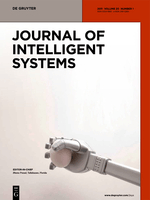
Journal of Intelligent Systems
Exploring the Intersection of AI and Information SystemsThe Journal of Intelligent Systems, published by DE GRUYTER POLAND SP Z O O, is a premier open access journal that has been at the forefront of advancements in the fields of Artificial Intelligence, Information Systems, and Software Engineering since its inception in 1991. With a commitment to disseminating high-quality research, the journal has been recognized in the 2023 category quartiles as Q3 in these critical areas, reflecting its relevance and impact in the academic community. The journal serves as a vital platform for researchers, professionals, and students interested in the evolving landscape of intelligent systems, offering insights into innovative methodologies and applications. As an open access publication since 2020, it ensures that research is readily available to a global audience, fostering collaboration and engagement within the scientific community. With a Scopus rank in the 65th to 69th percentiles across its categories, The Journal of Intelligent Systems continues to contribute significantly to the discourse on intelligent technologies and their implications for the future.
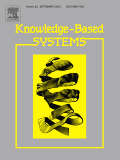
KNOWLEDGE-BASED SYSTEMS
Exploring Innovations in Artificial Intelligence and Decision SciencesKNOWLEDGE-BASED SYSTEMS, published by ELSEVIER, is a leading international journal that has established itself as a cornerstone in the fields of Artificial Intelligence, Information Systems and Management, and Software Development. With an impressive track record of over 35 years in publication, this journal is highly regarded for its significant contributions to the understanding and advancement of intelligent systems, providing a platform for innovative research and applications. It boasts a strong impact factor, maintaining a Q1 ranking across multiple categories, including Management Information Systems and Decision Sciences, reflecting its prestige and relevance in the academic community. Researchers and practitioners alike benefit from access to high-quality, peer-reviewed articles that explore the intersection of knowledge management and transformative technologies. The journal's commitment to fostering interdisciplinary research encourages the dissemination of knowledge that shapes the future of intelligent decision-making processes. With a substantial audience that includes professionals, academics, and students, KNOWLEDGE-BASED SYSTEMS continues to be a vital resource for those at the frontier of technological advancement.

NETWORK-COMPUTATION IN NEURAL SYSTEMS
Innovating the Intersection of Neuroscience and Computational ModelsNETWORK-COMPUTATION IN NEURAL SYSTEMS is a distinguished journal published by Taylor & Francis Inc, focusing on the innovative intersection of network theory and neural computation. Since its inception in 1990, this journal has provided a vital platform for researchers and professionals in the field of neuroscience, exploring the dynamics of neural networks and computational models. With its current Q3 category ranking in Neuroscience (miscellaneous) and a robust position in Scopus, the journal plays a critical role in advancing knowledge and discussion within this interdisciplinary area. The journal addresses a wide range of topics related to the computational aspects of neural systems, fostering collaboration and providing valuable insights amongst scholars. Although it is not an open-access publication, its well-curated content remains accessible through institutional subscriptions, ensuring that significant research reaches the hands of those who need it. As it continues to evolve through 2024 and beyond, NETWORK-COMPUTATION IN NEURAL SYSTEMS stands as a key resource for anyone deeply engaged in understanding the complexities and intricacies of neural computations.

AI, published by MDPI, is a distinguished open access journal dedicated to advancing the field of artificial intelligence. Since its inception in 2020, the journal has swiftly established itself as a prominent platform for scholarly research, currently ranking in the Q2 category for 2023 within the artificial intelligence sector according to Scopus. With an impressive global reach from its base in Basel, Switzerland, the journal aims to foster innovation and collaboration among researchers, professionals, and students alike, providing a forum to share groundbreaking findings and applications in AI. The journal's commitment to accessibility ensures that research is available to a wide audience, enhancing knowledge dissemination and contributing significantly to the ongoing evolution of artificial intelligence technologies. To explore the latest in AI research, readers can access articles through their open access model, encouraging an inclusive academic environment.

JOURNAL OF INTELLIGENT INFORMATION SYSTEMS
Unlocking the Potential of Intelligent Information SystemsThe Journal of Intelligent Information Systems, published by Springer since 1992, is a premier academic journal that offers a multidisciplinary platform in the fields of Artificial Intelligence, Computer Networks and Communications, Hardware and Architecture, Information Systems, and Software. With an impressive impact reflected in its 2023 Q2 category rankings across multiple domains and a commendable standing in the Scopus Rankings—ranking #84 in Computer Networks and Communications and #101 in Artificial Intelligence—the journal is recognized for its contribution to advancing knowledge and innovation. Although it is not an open-access journal, its accessibility through institutional subscriptions ensures that a wide range of researchers, professionals, and students can engage with high-quality, peer-reviewed research that addresses the latest advancements and trends in intelligent systems. For over three decades, this journal has effectively bridged gaps between academia and industry, making it a vital resource for those aiming to push boundaries in intelligent information systems.
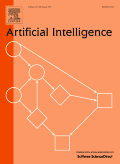
ARTIFICIAL INTELLIGENCE
Pioneering Research in Artificial Intelligence and Language StudiesArtificial Intelligence, published by Elsevier, is a premier scholarly journal that has been at the forefront of research in the fields of Artificial Intelligence, Linguistics, and Language Studies since its inception in 1970. With a prestigious ranking in the Q1 quartile for both its primary categories, the journal is recognized for its significant contributions to the understanding and advancement of AI technologies and their applications in natural language processing. It is highly regarded in academic circles, reflected in its exceptional Scopus Rankings—placing it in the 99th percentile in both Arts and Humanities, and Social Sciences, as well as a respectable 85th percentile in Computer Science, specifically within Artificial Intelligence. Although Open Access options are not currently available, the journal provides a vital platform for researchers, professionals, and students to disseminate groundbreaking ideas, fostering innovation and collaboration in this rapidly evolving field. The journal's comprehensive scope aims to bridge theoretical advancements with practical applications, making it an invaluable resource for those seeking to explore the intersection of technology and linguistics.
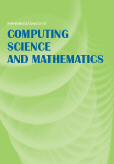
International Journal of Computing Science and Mathematics
Advancing Knowledge at the Intersection of Science and TechnologyThe International Journal of Computing Science and Mathematics, published by INDERSCIENCE ENTERPRISES LTD, is a pivotal platform for the dissemination of cutting-edge research in the intertwined disciplines of computing science and mathematics. With an ISSN of 1752-5055 and an E-ISSN of 1752-5063, the journal primarily serves the academic community engaged in applied mathematics, computational mathematics, theoretical computer science, and more, making significant contributions that resonate across various fields of technology and science. While the journal is currently categorized in the Q4 quartile for multiple related fields, including Applied Mathematics and Computational Theory, it continues to strive towards advancing the knowledge and practice within these areas. Spanning years from 2007 to 2010 and again from 2012 to 2024, the journal seeks to publish high-quality, peer-reviewed articles that not only address theoretical advancements but also explore practical applications of computing science in mathematical contexts, thereby fostering collaboration among researchers, professionals, and students alike. Please note that this journal is not available as Open Access, thus ensuring a curated content selection intended for dedicated research communities.